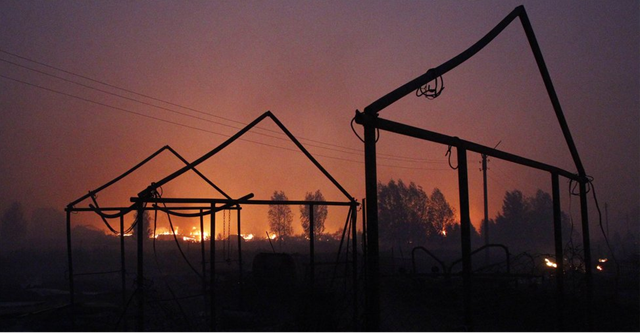Russia wildfires: ‘Even the road seemed to be on fire. It was like descending into hell’
By Shaun Walker in Mokhovoye
Thursday, 5 August 2010 “All around us, everything was on fire,” says Vladimir Anuryev. “Houses, trees, the ground itself – it was all in flames. Even the asphalt on the road seemed to be on fire. It was like descending into hell.” The 73-year-old has lived in Mokhovoye, a village of around 400 people about 100 miles from Moscow, since 1947. But last Thursday, almost everything in the village burnt down in one of the many tragedies across European Russia in the past week, as an unprecedented heatwave caused the worst outbreak of forest fires for decades. Seven people from Mokhovoye are known to have died, and another seven are missing. Overall, the confirmed death toll from fires in the past week is 48, with more than 2,000 homes destroyed, and no sign of the flames being extinguished for good. Thousands have been left homeless and a state of emergency declared in seven regions. As the residents of Mokhovoye camped out in a makeshift hostel in the regional centre of Beloomut yesterday, waiting for financial compensation for their lost possessions and property, many of them joined those from other villages hit by the fires in blaming local officials. They say the response to the blazes was uncoordinated and woefully inadequate. Everyone in Mokhovoye knew something was wrong when they woke up that morning. The acrid smoke that had hung over the village for days was getting thicker, and then hurricane-level winds began to pick up. By 10am, everyone had gathered their passports and important documents, and many of those with their own transport had fled. Residents say they called the police and other emergency services, saying the fires were coming and the village had to be evacuated, but they were told they had to deal with it themselves. The young people of Mokhovoye gathered into teams with spades, trying to dig trenches that would stop the peat bog fires in their tracks. But it was too late. At six in the evening, when the fire reached the village’s apartment blocks and wooden houses, there was nothing left to do but try to escape in any way possible. “By then we weren’t even trying to put it out, the only task was to stay alive,” said one woman who was waiting in line to collect the first part of her compensation in Beloomut yesterday. …
Russian wildfires: ‘Even the road seemed to be on fire. It was like descending into hell’ 
AHN News Staff
August 4, 2010 8:09 p.m. EST Moscow, Russian Federation (AHN) – Russian President Dmitry Medvedev on Wednesday fired a string of military officers at an emergency meeting of the national Security Council on the fire disaster. Cutting short his summer break in Sochi, Medvedev returned to Moscow to chair the meeting after a new wildlife fire reached a secret nuclear research facility. His decision came after fire destroyed aeronautical equipment, 17 warehouses containing vehicles and office buildings, including financial department and staff headquarters at a naval logistics base in Kolomna, near Moscow. “I order the Ministry of Defense to fire a whole number of officers for the disciplinary infringements that were allowed to take place,” the president said in televised comments. Russian Navy Logistics Division Head Sergei Sergeyev and Naval Aviation Head Nikolai Kuklev are among those who had been sacked. “If something similar happens in other places and departments, I will act in the same way, without any pity,” the president added. Meanwhile, Russia’s nuclear agency head Sergei Kiriyenko assured Medvedev that all explosives and radioactive materials had been taken away, adding that more than 2,000 emergency services officials and hundreds of armed forces’ members were also dispatched to Sarov. “I can guarantee that even in an extreme situation with squalling winds there is no danger to nuclear security, no threat of radiation, explosions, or environmental consequences,” he added. …
Russia Sacks Military Officers After Wildfires Reach ‘Secret’ Nuclear Facility
By Lena Melnikova
Thursday, 5 August 2010 For weeks now, life in Moscow has been like living on the set of a Tarkovsky film. We haven’t seen blue skies for ages – just various shades of a bright-greyish nightmare. But yesterday was the worst ever. I did not want to get out of bed to face another obnoxiously hot morning. Overnight, the wind blew more smoke in from the blazing forests and moors around the city. The smog settled among the trees and apartment blocks, obstructing the sun and views of distant buildings. The smell of burning gets into your clothes, hair, even the furniture and curtains. It makes your throat itch and eyes water. Most people are coughing, complaining of headaches and nausea. The carbon monoxide level was 10 times above normal yesterday. No one knows what the health implications are. But it’s the only topic of conversation. The shops have sold out of air-conditioning units and fans and no one knows when more are due in. Even our pets are suffering – I try and walk my dog, but it’s sad to see her snuffling around in the dead grass, with no fresh air. At home, she lies around listlessly. In offices, no one bothers about a dress code anymore – it’s all mini-skirts and shorts, see-through tops and flip-flops. The latest fashion is for face masks like the ones people donned during the bird and then swine flu panics. This time, we need them. Ironically, when the heatwave hit first, we Muscovites kept complaining about the Tube being too stuffy – but nearly six weeks on it’s an underground oasis, a smog-free microclimate. Before, we relished the summer as an opportunity to get out of our cars. Now, we relish sitting in the ones with air-conditioning, some of us talking about sleeping in them. …
Dark rumours in a city suffering a nightmare of heat and smog
